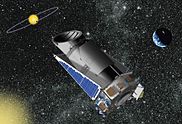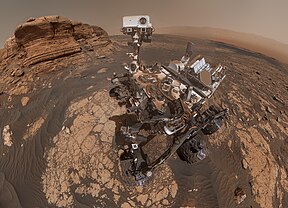
Back Buiteaardse lewe Afrikaans الحياة خارج الأرض Arabic Ерҙән ситтәге тереклек Bashkir Пазаземнае жыццё Byelorussian Извънземен живот Bulgarian বহির্জাগতিক প্রাণ Bengali/Bangla Buhez arallved Breton Vida extraterrestre Catalan ژیان لە دەرەوەی زەوی CKB Mimozemský život Czech
This article's lead section contains information that is not included elsewhere in the article. (February 2024) |
- The search for extrasolar planets (image: Kepler telescope)
- Listening for extraterrestrial signals indicating intelligence (image: Allen array)
- Robotic exploration of the Solar System (image: Curiosity rover on Mars)
Extraterrestrial life, alien life, or colloquially simply aliens is life which does not originate from Earth. No extraterrestrial life has yet been conclusively detected. Such life might range from simple forms such as prokaryotes to intelligent beings, possibly bringing forth civilizations that might be far more advanced than humanity.[1][2][3] The Drake equation speculates about the existence of sapient life elsewhere in the universe. The science of extraterrestrial life is known as astrobiology.
Speculation about the possibility of inhabited worlds beyond Earth dates back to antiquity. Early Christian writers discussed the idea of a "plurality of worlds" as proposed by earlier thinkers such as Democritus; Augustine references Epicurus's idea of innumerable worlds "throughout the boundless immensity of space" (originally expressed in his Letter to Herodotus) in The City of God.[4]
Pre-modern writers typically assumed extraterrestrial "worlds" are inhabited by living beings. William Vorilong, in the 15th century, acknowledged the possibility that Jesus could have visited extraterrestrial worlds to redeem their inhabitants.[5] Nicholas of Cusa wrote in 1440 that Earth is "a brilliant star" like other celestial objects visible in space; which would appear similar to the Sun from an exterior perspective due to a layer of "fiery brightness" in the outer layer of the atmosphere. He theorised all extraterrestrial bodies could be inhabited by men, plants, and animals, including the Sun.[6] Descartes wrote that there was no means to prove that the stars were not inhabited by "intelligent creatures", but their existence was a matter of speculation.[7]
Furthermore, when considering the atmospheric composition and ecosystems hosted by these extraterrestrial bodies, the matter of extraterrestrial life seems more of a speculation than reality due to the harsh conditions and disparate chemical composition of the atmospheres[8] when compared to the life-abundant Earth. However, there are many extreme and chemically harsh ecosystems on Earth that do support forms of life and are often hypothesized to be the origin of life on Earth. Hydrothermal vents,[9] acidic hot springs,[10] and volcanic lakes[11] are all prime examples of life forming under difficult circumstances, and could provide parallels to the extreme environments on other planets and give hope to the possibility of extraterrestrial life.
Since the mid-20th century, active research has taken place to look for signs of extraterrestrial life, encompassing searches for current and historic extraterrestrial life, and a narrower search for extraterrestrial intelligent life. Depending on the category of search, methods range from the analysis of telescope and specimen data[12] to radios used to detect and transmit communications.[citation needed]
The concept of extraterrestrial life, and particularly extraterrestrial intelligence, has had a major cultural impact, especially extraterrestrials in fiction. Science fiction has communicated scientific ideas, imagined a wide range of possibilities, and influenced public interest in and perspectives on extraterrestrial life. One shared space is the debate over the wisdom of attempting communication with extraterrestrial intelligence. Some encourage aggressive methods to try to contact intelligent extraterrestrial life. Others – citing the tendency of technologically advanced human societies to enslave or destroy less advanced societies – argue it may be dangerous to actively draw attention to Earth.[13][14]
- ^ Frank, Adam (31 December 2020). "A new frontier is opening in the search for extraterrestrial life – The reason we haven't found life elsewhere in the universe is simple: We haven't really looked until now". The Washington Post. Retrieved 1 January 2021.
- ^ Davies, Paul (18 November 2013). "Are We Alone in the Universe?". The New York Times. Archived from the original on 1 January 2022. Retrieved 20 November 2013.
- ^ Pickrell, John (4 September 2006). "Top 10: Controversial pieces of evidence for extraterrestrial life". New Scientist. Retrieved 18 February 2011.
- ^ Crowe, Michael J. (2008). The extraterrestrial life debate, antiquity to 1915: a source book/edited by Michael J. Crowe. University of Notre Dame. pp. 14–16.
- ^ Crowe, Michael J. (2008). The extraterrestrial life debate, antiquity to 1915: a source book/edited by Michael J. Crowe. University of Notre Dame. pp. 26–27.
- ^ Nicholas of Cusa. (1954). Of Learned Ignorance. Translated by Germain Heron. Routledge. pp. 111–118.
- ^ Crowe, Michael J. (2008). The extraterrestrial life debate, antiquity to 1915: a source book/edited by Michael J. Crowe. University of Notre Dame. p. 67.
- ^ Catling, D.C. (2015), "Planetary Atmospheres", Treatise on Geophysics, Elsevier, pp. 429–472, Bibcode:2015trge.book..429C, doi:10.1016/b978-0-444-53802-4.00185-8, ISBN 978-0-444-53803-1, retrieved 17 April 2024
- ^ Shibuya, Takazo; Takai, Ken (16 November 2022). "Liquid and supercritical CO2 as an organic solvent in Hadean seafloor hydrothermal systems: implications for prebiotic chemical evolution". Progress in Earth and Planetary Science. 9 (1). doi:10.1186/s40645-022-00510-6. ISSN 2197-4284.
- ^ Damer, Bruce; Deamer, David (1 April 2020). "The Hot Spring Hypothesis for an Origin of Life". Astrobiology. 20 (4): 429–452. Bibcode:2020AsBio..20..429D. doi:10.1089/ast.2019.2045. ISSN 1531-1074. PMC 7133448. PMID 31841362.
- ^ Mapelli, Francesca; Marasco, Ramona; Rolli, Eleonora; Daffonchio, Daniele; Donachie, Stuart; Borin, Sara (2015), Rouwet, Dmitri; Christenson, Bruce; Tassi, Franco; Vandemeulebrouck, Jean (eds.), "Microbial Life in Volcanic Lakes", Volcanic Lakes, Berlin, Heidelberg: Springer Berlin Heidelberg, pp. 507–522, doi:10.1007/978-3-642-36833-2_23, hdl:2434/266460, ISBN 978-3-642-36832-5, retrieved 17 April 2024
- ^ Overbye, Dennis (6 January 2015). "So Many Earth-Like Planets, So Few Telescopes". The New York Times. Archived from the original on 1 January 2022. Retrieved 6 January 2015.
- ^ Ghosh, Pallab (12 February 2015). "Scientists in US are urged to seek contact with aliens". BBC News.
- ^ Baum, Seth; Haqq-Misra, Jacob; Domagal-Goldman, Shawn (June 2011). "Would Contact with Extraterrestrials Benefit or Harm Humanity? A Scenario Analysis". Acta Astronautica. 68 (11): 2114–2129. arXiv:1104.4462. Bibcode:2011AcAau..68.2114B. doi:10.1016/j.actaastro.2010.10.012. S2CID 16889489.
© MMXXIII Rich X Search. We shall prevail. All rights reserved. Rich X Search


